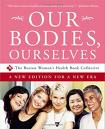 The definitive women’s health sourcebook, Our Bodies, Ourselves written by the Boston Women’s Health Book Collective is undergoing revisions for its 40th anniversary (and 9th) edition. Lots of folks in the women’s health community are involved in the revision and that’s a good thing—multiple voices, multiple perspectives.
The definitive women’s health sourcebook, Our Bodies, Ourselves written by the Boston Women’s Health Book Collective is undergoing revisions for its 40th anniversary (and 9th) edition. Lots of folks in the women’s health community are involved in the revision and that’s a good thing—multiple voices, multiple perspectives.
I am among those reviewing the chapter on Sexual Anatomy, Reproduction, and the Menstrual Cycle in collaboration with others, such as health educator and activist, Esther Morris Leidolf, founder of the MRKH organization (MRKH=Mayer Rokitansky Kuster Hauser Syndrome, a.k.a. congential absence of the vagina) For years, Esther has been nudging me to be more inclusive in my research, writing and teaching of people with variant sexual anatomy. And she did it again.
While reviewing the content on MENOPAUSE in this chapter, she questioned the definition of this biosocial transtion used (that is, the cessation of menstruation, specifically, 12 months after the last menstrual period (LMP)).
She asked: What about women who don’t menstruate?
What about women who may not have vaginas or others with variant sexual anatomy that prevents menstuation. Many of these women still experience other menopausal symptoms, such as hot flashes and mood swings.
Our current definition of menopause excludes such women and that’s a problem; it leaves women who do not menstruate OUT.
The assumption of menstruation for ALL women is a pervasive problem and it runs deep.
Culturally-speaking it is common to collapse womanhood with menstruation. But there women who don’t menstruate (there’s some athletes, anorexics, women on continuous contraception, and post-menopausal women as well as those with variant sexual anatomy, as referenced above) and the list goes on). And they are still women, of course. And there’s gender queer folks, intersex folks and transgender women who do not menstruate, too.
In other words, not ALL women menstruate and not ONLY women menstruate.
This overlooked fact leads us to sloppy definitions that exclude. I want to be more mindful of this. Defintions are helpful, even imperative–they help us make sense of our world. But they also draw boundaries that quickly become fences that keep people out. That’s another, even bigger problem and one that cannot be easily resolved. Still, as Esther wisely points out, its important to be ever mindful of how we define ourselves and others.


Even those women who DO menstruate regularly only do so for part of their lives, really. If you think about more than just the effects of postmenopause, athletics, anorexia, continuous contraception, and specific physical conditions (all things you appropriately mention above), women also do not menstruate before puberty either. And women who have children don’t menstruate during pregnancy and early breastfeeding. So, when you add it all up, women who DO menstruate regularly probably only do so for about half of their lives (or even less) on average? This does not discount the importance of menstruation at all, but it does make us see how silly it is to equate a certain type of menstruation with womanhood. Thanks, Chris, for posting this!
Right on, Heather. Thanks for this. The challenge is to keep the focus on the importance of mensttruation without using it to essentialize women. But it can be done….just requires constant scrutiny of our assumptions and our language.
What’s interesting to me is that while women with MRKH may not menstruate – as in experience a monthly flow – it seems that many do experience the hormonal ebbs and flows of a normal menstrual cycle, and the transition through perimenopause as defined by the many symptoms women may experience with or without blood flow. Broadening our understanding and awareness of the hormonal events that unfold during a menstrual cycle and their connection to women’s health and wellness, such as the building of bone density and the impact on breast health, can help broaden our conceptualization of this aspect of female experience. It is not just about the blood.
I was happy to read this as a woman who is going through the symtoms of the menopause – especially hot flushes – but has not had a period for over 5 years due to hysterectomy!